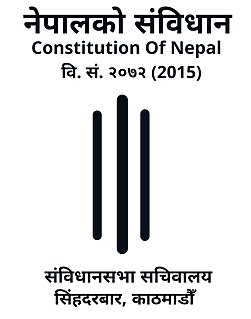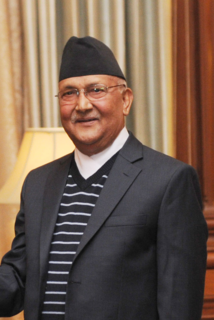Related Research Articles

Nepal, officially the Federal Democratic Republic of Nepal, is a landlocked country located in South Asia. It is mainly situated in the Himalayas, but also includes parts of the Indo-Gangetic Plain, bordering Tibet of China to the north, and India in the south, east, and west, while it is narrowly separated from Bangladesh by the Siliguri Corridor, and from Bhutan by the Indian state of Sikkim. Nepal has a diverse geography, including fertile plains, subalpine forested hills, and eight of the world's ten tallest mountains, including Mount Everest, the highest point on Earth. Nepal is a multi-ethnic, multi-lingual, multi-religious and multi-cultural state, with Nepali as the official language. Kathmandu is the nation's capital and the largest city.

The Nepalese Civil War was a protracted armed conflict that took place in Nepal between the Communist Party of Nepal (Maoist) (CPN-M) and the Government of Nepal from 1996 to 2006. The conflict period is known as the Saśastra Dvandvakāla in Nepal.

Begging is the practice of imploring others to grant a favor, often a gift of money, with little or no expectation of reciprocation. A person doing such is called a beggar or panhandler. Beggars may operate in public places such as transport routes, urban parks, and markets. Besides money, they may also ask for food, drinks, cigarettes or other small items.

The Constitution of Nepal regulates provisions for Nepali nationality in Articles 8, 9 and 10. The Nepal Citizenship Act 1964 was first promulgated on 28 February 1964 and provides for a single citizenship for the entire country to inherit Nepali nationality. The Nepal Citizenship Act, 2006 was enacted on 26 November 2006. It repeals the 1964 Act and makes further provisions for acquisition and termination of Nepali citizenship and related. All u need to have citizenship card is your father and mother citizenship card and your birth certificate.

Constitution of Nepal 2015 is the present governing Constitution of Nepal. Nepal is governed according to the Constitution which came into effect on Sept 20, 2015, regarding the Interim Constitution of 2007. The constitution of Nepal is divided into 35 parts, 308 Articles and 9 Schedules.

Christianity is, according to the 2011 census, the fifth most practiced religion in Nepal, with 375,699 adherents, or 1.4% of the population. However, it is widely claimed that non-Hindus are systematically under-reported in Nepal's censuses, and informed observers have estimated that there are at least 1 million Nepali Christians. According to some Christian groups, there may be as many as 3 million Christians in Nepal, constituting up to 10% of the country's population. A report by Gordon Conwell Theological Seminary identified the Nepali church the fastest growing in the world. The vast majority of Nepali Christians are evangelical Protestants ; there is also a small Catholic population of roughly 10,000.

Lesbian, gay, bisexual and transgender (LGBT) rights in Nepal are among the most progressive in Asia. The Nepalese Constitution recognizes LGBT rights as fundamental rights.

Vagrancy is the condition of homelessness without regular employment or income. Vagrants usually live in poverty and support themselves by begging, scavenging, petty theft, temporary work, or welfare. Historically, vagrancy in Western societies was associated with petty crime, begging and lawlessness, and punishable by law with forced labor, military service, imprisonment, or confinement to dedicated labor houses.
According to Non resident Nepali act, 2007 Non Resident Nepali (NRN) means the following:

Khadga Prasad Sharma Oli is a Nepalese politician and former Prime Minister of Nepal. He served three terms as prime minister from 11 October 2015 to 3 August 2016, from 15 February 2018 to 13 May 2021 as the first elected prime minister under the new constitution, and from 13 May 2021 to 13 July 2021.

Ministry of Finance is the central authority of Government of Nepal charged with the responsibilities for maintaining both micro and macro economic stability in the country. The position of finance minister in Nepal is currently held by Janardan Sharma, appointed on 13 July 2021.

The Vagabonds Act 1530 was an act passed under Henry VIII and is a part of the Tudor Poor Laws of England. In full, it was entitled "An Act directing how aged, poor and impotent Persons, compelled to live by Alms, shall be ordered; and how Vagabonds and Beggars shall be punished."

Swastima Khadka is a Nepalese actress who predominantly works in Nepali cinema. She has appeared in Love Love Love (2017), Chhakka Panja 2 (2017), Nai Nabhannu La 5 (2018), and Bulbul (2019).

A municipality in Nepal is an administrative division in the Provinces of Nepal. The urban population of Nepal refers to the inhabitants residing in the designated municipal area. Population size has been taken as the principal criteria in the declaration of urban areas in Nepal since 1961. Municipalities can therefore also include rural areas. It functions as a sub-unit of a district. Nepal currently has 293 municipalities, which given the 2011 population estimate of 16,656,057.

Provincial assembly elections were held in Nepal on 26 November and 7 December 2017 along with the legislative elections. 330 seats in the seven newly created provincial assemblies were elected by first-past-the-post voting and 220 by proportional representation. The election was part of Nepal's transformation to a federal republic. Next Election will be held in 2022 unless dissolved earlier without completing the five years term. 2022 Nepalese provincial election will be the second election for provinces after completion of tenure of five years.

The Chief of Army Staff (COAS), informally known as Chief Sa'ab, is the head and chief executive of the Nepalese Armed Forces. The post is a military appointment and statutory office held by the highest ranking officer on active duty in the armed forces of Nepal.
The COVID-19 pandemic in Nepal is part of the worldwide pandemic of coronavirus disease 2019 caused by severe acute respiratory syndrome coronavirus 2. The first case in Nepal was confirmed on 23 January 2020 when a 31-year-old student, who had returned to Kathmandu from Wuhan on 9 January, tested positive for the disease. It was also the first recorded case of COVID-19 in South Asia. Nepal's first case of local transmission was confirmed on 4 April in Kailali District. The first death occurred on 14 May. A country-wide lockdown came into effect on 24 March 2020, and ended on 21 July 2020. As of 29 July 2021, the Ministry of Health and Population (MoHP) has confirmed a total of 690,642 cases, 650,445 recoveries, and 9,807 deaths in the country. In the meantime, 3,584,419 real-time RT-PCR (RT-qPCR) tests have been performed in 40 laboratories across the country. The viral disease has been detected in all provinces and districts of the country, with Bagmati Province and Kathmandu being the worst hit province and district respectively. As for Nepalese abroad, as of 26 July 2020, the Non-Resident Nepali Association has reported a total of 12,667 confirmed cases, 16,190 recoveries, and 161 deaths across 35 countries.
The following is the timeline of the COVID-19 pandemic in Nepal.
Intercaste marriage (ICM), also known as marrying out of caste, is a form of exogamous nuptial union that involve two individuals belonging to different castes. Intercaste marriages are particularly perceived as socially unacceptable and taboo in certain South Asian societies.
References
- 1 2 3 4 "Begging (Prohibition) Act, 2018 (1962)" (PDF). Nepal Law Commission. 11 April 1962. Archived (PDF) from the original on 10 June 2020. Retrieved 10 June 2020.
- ↑ Nogler, Luca; Pertile, Marco (15 April 2016). Child Labour in a Globalized World: A Legal Analysis of ILO Action. Routledge. ISBN 978-1-317-16801-0. Archived from the original on 10 June 2020. Retrieved 10 June 2020.
- 1 2 3 Bayalkoti, Dipak (14 August 2014). "Beggar population swells as anti-begging Act gathers dust". The Kathmandu Post. Archived from the original on 10 June 2020. Retrieved 10 June 2020.
- 1 2 "Free press on edge as new laws come into force today". The Kathmandu Post. Archived from the original on 10 June 2020. Retrieved 10 June 2020.
- ↑ "Begging (Prohibition) Act, 2018 (1962)". Nepal Law Commission. Archived from the original on 10 June 2020. Retrieved 10 June 2020.
- ↑ "Freeing capital streets of vagabonds an uphill task for KMC". The Rising Nepal. Archived from the original on 10 June 2020. Retrieved 10 June 2020.
- ↑ "Chapter-12 Offences and Punishment". Nepal Law Commission. Archived from the original on 20 May 2020. Retrieved 10 June 2020.
- ↑ "15 things in the new national law every Nepali should know about". The Kathmandu Post. Archived from the original on 10 June 2020. Retrieved 10 June 2020.